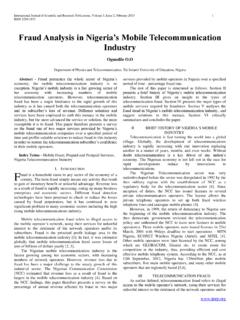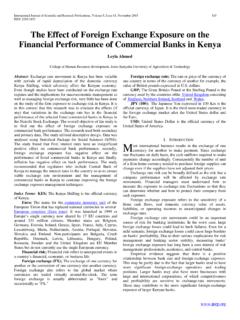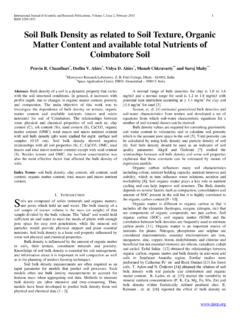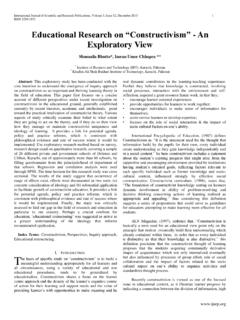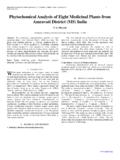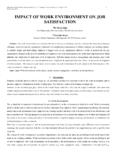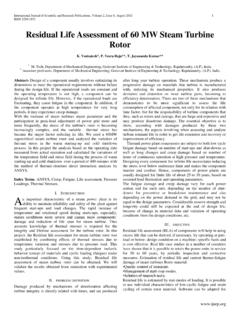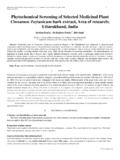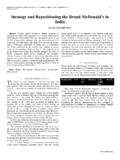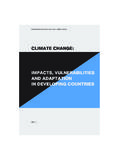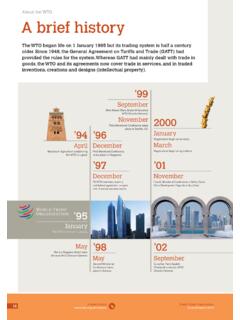Transcription of Economic Impact of MNCs on Development of Developing …
1 International Journal of Scientific and Research Publications, Volume 4, Issue 9, September 2014 1. ISSN 2250-3153. Economic Impact of MNCs on Development of Developing Nations Ondabu Ibrahim Tirimba, George Munene Macharia PHD Finance Candidate, Jomo Kenyatta University of Agriculture and technology Abstract- Multinational corporations do not come into being structure of the world economy is the result of centuries of from thin air; there must be a form, an organization, and a goal technological evolution and advancement. According to Clicker for them to be brought into existence. Many studies that have (1990) the dominant player in the modern world investment set been carried out in Europe and the rest of Developing nations up is the multinational corporations.
2 According to Root (1994), have concentrated on the benefits of Multinational corporations an MNC is a parent company that engages in foreign production but literature still remains very little when Africa and the rest of through its affiliates located in several countries, exercises direct the Developing nations are touched. This study sought to bridge control over the policies of its affiliates, and implements business the gap of MNC by adding more literature on factual findings strategies in production, marketing, finance and staffing that from a Developing country context such as Kenya. It was transcend national boundaries. centered on principles of employment creation, poverty and These are giant businesses which have expanded and crossed dependency reduction and foreign direct investment.
3 The study national frontiers, operate globally and whose organizational was geared towards the historical background of global framework is complex. Robbok and Simmonds (1989) asserted investments while tracing their evolution from small businesses that, the rise of the multinational corporations has confronted the to their giant investments that today their massive capital is a real nation state with challenges of the operations of the local threat to the nation when issues of capital flight fall due. The jurisdiction. The nation state has had to grapple with national study is important to policy makers in deciding whether to interests and how to protect them from being compromised by continue depending upon multinational corporations which result the multinational corporations whose focus is control and transfer in eventual capital flight or to nurture the local companies for of goods and money as they cross national borders.
4 Sustainable Development . The research adopted descriptive Robbok and Simmonds (1989) as well trace the early research design. On the basis of facts presented in this study, the investment. In 1851 an American (singer) invented the modern MNC has outlived the usefulness as a Development agent. The sewing machine. This gave way to a number of subsidiaries in role of MNCs should be redefined in the context of the LDCs in different continents in two decades. After this pioneering which they operate finally; LDCs should ensure stable political invention, others followed and wanted to divorce themselves systems to ensure sound Economic policies. The study also from the control of the parent country. Such group was the Otis concludes that the government should take a prerogative role in brothers (also Americans) who invented the modern lift in 1859.
5 Supporting the operations of the MNCs since they have boosted In 1890 Alfred Nobel of Sweden invented dynamite and set up the Economic Development of the Developing countries with a various subsidiaries in Germany and other European countries so drive towards full employment. However, the over-dependence as to transfer technology as crucial as handling explosives. on these MNCs should be avoided at all costs. In the Developing countries, the MNCs are no longer viewed with colonialism or protection from their countries. A new breed Index Terms- Multinational Corporations, Transfer Pricing, of dynamite and aggressive MNCs has emerged over the last Poverty and dependency, Less Developed Countries three decades. They have cast the stigma of the past which long characterized their predecessors and have thrived on the ability to make more profits and contribute to Economic Development on I.
6 INTRODUCTION their host countries. Nyong'o (1991) strongly contends that, nation-state building requires politically strong nationalistic local M ultinational corporations as we know do not come into being from thin air. There has to be some substance, some meaning and some objective for them to come into being. entrepreneurs. The study took scope of the General motors' corporation Historically, the evolution of multinational corporations date company which is an American multinational automaker based in back to the 15th century. At that time, the organization of the Detroit, Michigan and the world's second largest automaker with production unit was wholly private ownership of the means of its global headquarters in Detroit; GM employs 209,000 people production.
7 Using technology and simple division of labour, in every major region of the world and does business in some merchants could manufacture basic commodities, In situ- 157 countries. General motors' produce cars and trucks in 31. without need to travel, (Louis, 1994). countries and sells and services these vehicles through the Abdullah (1998) early multinational corporations took the following divisions: Buick, Cadillac, Chevrolet, GMC, Opel, form of alliances with the parent country's military or political Vauxhall, and Holden. GM's oyster subsidiary provides vehicle powers in extending their activities to foreign areas. Contrary to safety, security and informational services. Unfortunately, for the simplicity of production of the 15th century, modern complex example in Kenya, the manufacturers are the MNC subsidiaries with global interests that often conflict with the national desire to International Journal of Scientific and Research Publications, Volume 4, Issue 9, September 2014 2.
8 ISSN 2250-3153. build up local technological capacity and also the Asian profit. Many LDCs with growing economies and increasing businesses men without political clout to stop the imports that incomes may provide future growth markets (Kotler, 1994). idle local factories The structural transformation of the world Multinational corporations contribute to 65% of the non- economy through internationalization of big businesses has governmental employment opportunities available at any given become a real threat to the Economic as well as political country of host (Reid, 2001). Schermerhorn (2002) argues the interdependence of the nation-state. Scientists and political fact that for the case where many LDCs are often endowed with economists have researched and written on this subject for potentially large low wage labour forces and high levels of decades.
9 However, most of the writers have concentrated their unemployment, this might be considered inappropriate prosperity in their investment exploits. Majority are preoccupied technology and MNCs come in to equip the countries with with the brighter side of the MNC almost to the total exclusion of intrinsic knowledge aimed at acquiring a skilled work force in the dark side of the giant businesses. the industry It is a fact that MNCs have devastating effects on their host Gerrefi (2003) maintains that the cycles of poverty will not countries; they are crafty in their dealings. More often not many be broken from within the domestic economy. The level of who notice the negative effects including the host countries. The investment needed to raise productivity and incomes is not MNCs do more Economic and political harm and perpetuate possible.
10 Thus a foreign direct investment through multinational poverty in the LDCs. This indicates a situation really wanting corporations is essential (Mulwa, 2000). By investing in areas where no research has been comprehensively carried out. A study and utilizing the factors of production where the LDCs have an conducted by Bicknell (1999) has shown that MNCs located in absolute and comparative advantage MNCs will lead to a more LDC countries do help LDC countries in creating better living efficient allocation of the world's resources (Gesso, 1999). standards for competitiveness across the globe after which he Schermerhorn (2001) defined ways to engage Developing recommended for further research on the Economic Impact of countries into Development with the aid of the MNCs.
